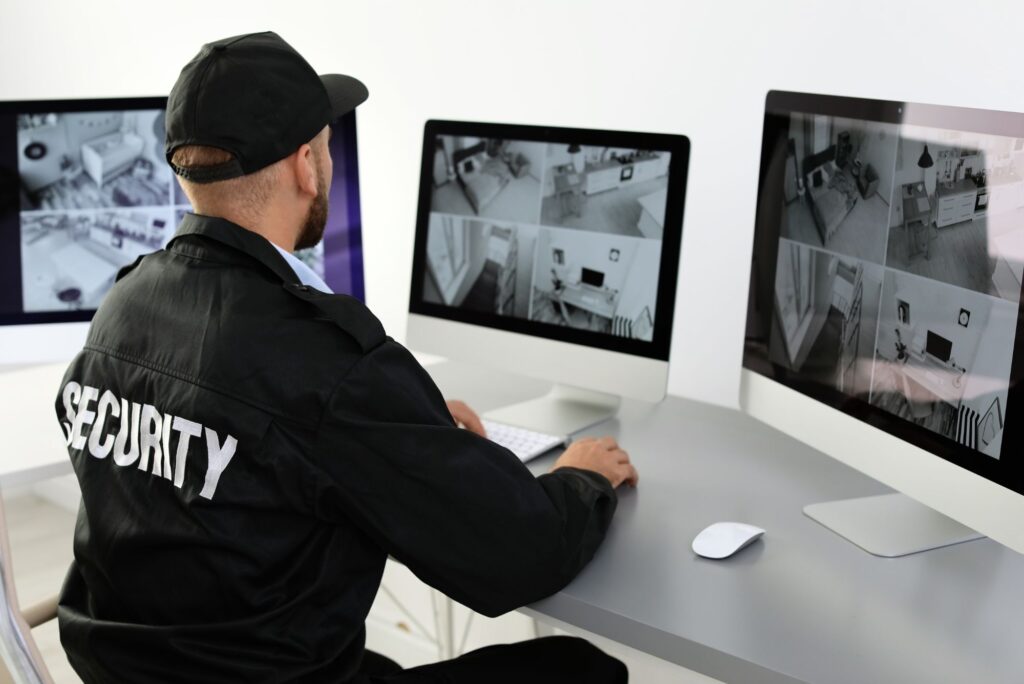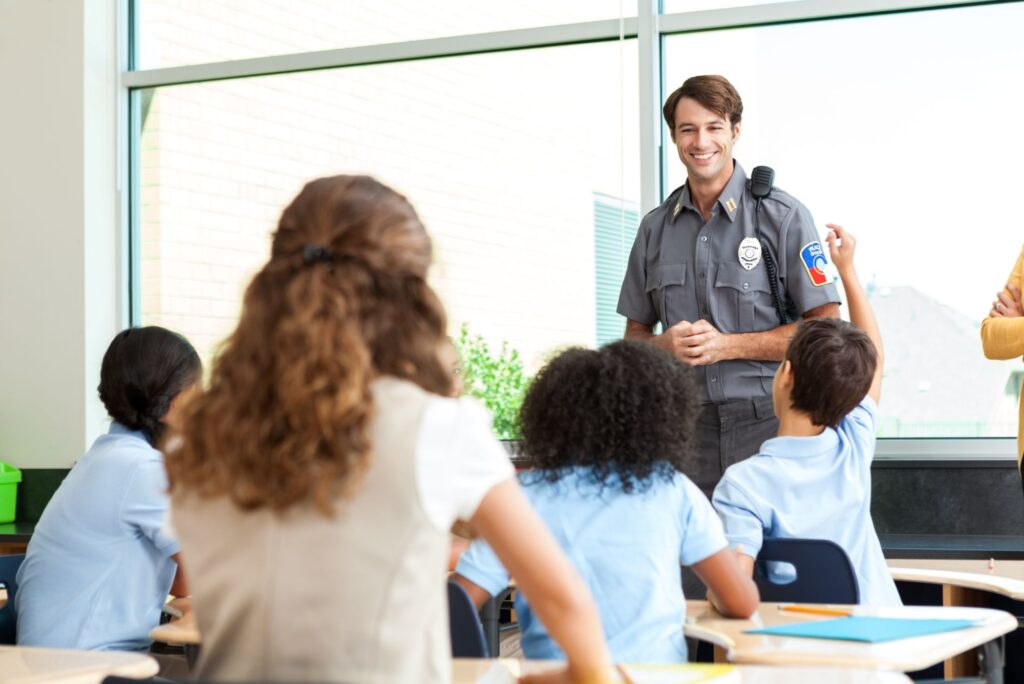Responsibilities of Security Guards in Australia
July 26, 2024
Security guards are often the unsung heroes of safety and protection, playing a vital role in maintaining order across diverse environments in Australia. Their duties go far beyond simply standing at entrances or monitoring access points. Acting as the vigilant eyes and ears of a facility, they proactively safeguard people, property, and assets from potential risks.
In today’s world, where security is more important than ever, it’s crucial to understand the wide-ranging responsibilities these professionals carry. Their work reflects not only the need for constant awareness but also the rigorous training, discipline, and dedication required to perform effectively.
This article explores the many responsibilities of security guards in Australia—blending expert insights with real-world applications—to shed light on the depth of their contribution to building a safer, more secure society.
Can Security Guard Touch You?
Dealing with Emergencies
Security guards are trained to respond to a wide range of emergencies, always prioritizing the protection of people and property. Whether dealing with fires, medical incidents, or natural disasters, their swift actions help reduce damage and prevent chaos. Often serving as the first line of response, they provide immediate assistance while coordinating with emergency services. Their ability to remain calm under pressure is critical, enabling them to make quick, life-saving decisions. Through regular drills and continuous updates on safety protocols, security guards stay prepared to manage any situation with efficiency and confidence.
Alarm Response
When an alarm is triggered, the immediate response is critical. They must quickly assess the situation, determine the cause, and take appropriate action to resolve it. This could involve silencing false alarms, coordinating with law enforcement, or evacuating individuals if necessary. Guards need to be familiar with the layout of the premises and the functioning of alarm systems to respond effectively. Their prompt and decisive actions can prevent potential threats from escalating. Security guards ensure they are always ready to act swiftly when alarms sound by maintaining a vigilant stance and routinely testing alarm systems.
Emergency Management
Security guards are pivotal in emergency management, encompassing preparation, response, and recovery. They help develop and implement emergency plans, conduct regular drills, and follow all safety protocols. In an emergency, guards manage the situation by guiding evacuations, providing first aid, and liaising with emergency services. Post-emergency, they assist in recovery by documenting incidents and supporting investigations. Their comprehensive approach to emergency management enhances safety and reassures employees and visitors that they are in capable hands.
Access Control
Controlling access to secure areas is a fundamental duty of security guards. They verify the identity of individuals seeking entry, ensuring only authorized personnel gain access. This involves checking IDs, managing visitor logs, and using technology such as key cards and biometric scanners. Effective access control prevents unauthorized entry and protects sensitive areas from potential threats. By being vigilant and maintaining strict protocols, security guards significantly reduce the risk of security breaches. Their presence at entry points also deter unauthorized attempts, reinforcing the overall security framework.
Observe and Report
One of the core responsibilities of security guards is to observe and report any unusual activities. They are trained to be vigilant, noticing details that others might overlook. Guards meticulously document incidents, providing detailed reports for future reference and investigations. These reports include observations, actions taken, and the outcomes, offering a comprehensive view of each incident. Accurate reporting ensures that management is informed of all security-related issues, allowing for continuous improvement in safety protocols. This duty not only helps in addressing immediate concerns but also contributes to long-term security planning.
Customer Service
Beyond their security duties, guards often serve as visitors’ first point of contact, offering assistance and information. Their role in customer service enhances the overall experience for visitors and employees alike. Guards provide directions, answer queries, and ensure that everyone feels welcomed and safe. Their presence can also help de-escalate conflicts and manage stressful situations, ensuring a peaceful environment. By balancing their security responsibilities with excellent customer service, guards contribute to a positive perception of the organization they protect. Their professionalism and courteous demeanour reinforce the importance of security in a friendly manner.
Keeping an Incident Report Record
Maintaining accurate incident reports is one of the key responsibilities of security guards. These reports serve as official records of all security-related events, detailing the incident, the actions taken, and the outcomes. Proper reporting promotes accountability and assists in identifying trends or recurring issues. Such documentation is also crucial for internal reviews and can provide valuable evidence during law enforcement investigations if required. Security guards must be precise and comprehensive when recording details, ensuring nothing important is overlooked. By maintaining clear and thorough reports, they help strengthen security protocols, improve preventive measures, and create a safer environment for everyone.
Maintain Order
Security guards are crucial in maintaining order, particularly in high-traffic or high-stress environments. Their presence alone acts as a deterrent to disruptive behaviour. Guards are trained to manage crowds, de-escalate conflicts, and enforce rules and regulations. By maintaining order, they ensure a safe and peaceful environment for everyone. This is particularly important during events or in locations with large numbers of people. Security guards must be proactive, anticipating and addressing potential issues before they escalate. Their ability to maintain order is essential for the smooth operation of any organization or event.
Monitoring
Continuous monitoring of the premises is a fundamental duty of security guards. This involves regular patrols, both on foot and by vehicle, and surveillance systems. By maintaining a constant watch, guards can quickly identify and respond to threats. Monitoring also includes checking that all security equipment functions correctly and that safety protocols are followed. This proactive approach helps in preventing incidents before they occur. Security guards must remain vigilant and attentive, ensuring no detail is overlooked. Their thorough monitoring is crucial for maintaining a secure environment.

Monitoring and Analyzing CCTV Camera Footage
Security guards are responsible for monitoring CCTV footage, a task that requires keen observation skills and attention to detail. By analyzing camera feeds, guards can detect suspicious activities, unauthorized access, or potential security breaches in real time. This continuous surveillance helps identify and respond to incidents immediately, preventing them from escalating. Reviewing recorded footage is also essential for post-incident investigations, providing valuable evidence for law enforcement or internal reviews. Effective use of CCTV systems enhances overall security by ensuring that all areas of the premises are under constant watch.
Monitoring and Securing Premises
Ensuring the premises’ security involves active monitoring and taking preventive measures. Security guards regularly check all entry points, windows, and security systems to confirm they are secure. They also perform routine inspections of the premises, identifying any vulnerabilities or potential security risks. By being thorough in their checks, guards can address issues before they become significant problems. This proactive approach to securing the premises helps in maintaining a safe environment. Security guards must be diligent and detail-oriented, ensuring that every aspect of the property is protected.
Patrolling
Regular patrols are a key responsibility for security guards, helping to deter criminal activities and maintain a visible security presence. These patrols can be conducted on foot, by bicycle, or in vehicles, covering all areas of the property. Guards check for signs of disturbance, unauthorized access, and safety hazards. Their presence during patrols acts as a deterrent to potential offenders. Security guards also interact with staff and visitors during patrols, enhancing their visibility and approachability. Effective patrolling requires a strategic approach, with guards varying their routes and schedules to avoid predictability.
Safety Checks
Regular safety checks are essential for ensuring the security and safety of the premises. Security guards inspect fire extinguishers, alarm systems, emergency exits, and other safety equipment to ensure they are in working order. These checks help identify potential safety hazards and address them promptly. Guards also review safety protocols and ensure compliance with regulations. By performing thorough safety checks, security guards help prevent accidents and provide a safe environment for everyone. Their attention to detail and commitment to safety are critical for maintaining high standards.
Communication
Effective communication is vital for the success of security operations. Security guards, management, and emergency services must coordinate with each other to ensure a swift and organized response to any situation. Clear and concise communication helps in relaying critical information quickly and accurately. Guards use radios, phones, and other communication tools to stay connected and informed. Good communication skills are essential for interacting with the public, assisting, and managing conflicts. By maintaining open lines of communication, security guards can respond effectively to incidents and ensure the safety of the premises.

Conducting Security Checks
Security guards are responsible for conducting thorough security checks of people, vehicles, and belongings to prevent unauthorized items or individuals from entering secure areas. These checks may include inspecting bags, using metal detectors, and verifying identities. Security checks are essential for maintaining the integrity of restricted areas and preventing potential threats. Guards must be thorough and respectful during these checks, ensuring that security protocols are followed without causing undue inconvenience. By conducting effective security checks, guards help maintain a secure environment and prevent security breaches.
Crime Prevention
A proactive approach to crime prevention involves identifying potential threats and implementing measures to mitigate them. Security guards are trained to recognize suspicious behaviour, conduct risk assessments, and take preventive actions. This may include improving lighting, securing entry points, and educating the public about safety practices. By being proactive, guards can prevent criminal activities before they occur. Their presence alone acts as a deterrent to potential offenders. Effective crime prevention requires continuous vigilance and a strategic approach to addressing security risks. Security guards are crucial in maintaining a safe environment through proactive crime prevention measures.
De-escalation of Crisis Situations
They are trained in conflict resolution and de-escalation techniques, essential for managing crises without force. When faced with a potentially volatile situation, guards use calm, assertive communication to defuse tensions and prevent escalation. Their ability to remain composed under pressure is crucial for resolving conflicts peacefully. Security guards can effectively manage crises by understanding the psychology of conflict and using non-violent methods. This approach not only ensures the safety of everyone involved but also maintains a peaceful environment. De-escalation skills are essential to a security guard’s training and toolkit.
Enforcing Rules and Regulations
They are responsible for enforcing the rules and regulations of the premises they protect. This includes ensuring employees, visitors, and contractors comply with organizational policies and safety protocols. Guards monitor activities to detect violations, such as unauthorized access, smoking in prohibited areas, or unsafe behaviors. By consistently enforcing rules, security guards maintain order and safety. They must balance firmness with fairness, applying rules consistently and without bias. Effective enforcement of rules and regulations helps create a secure and orderly environment.
Patrols
In addition to regular patrols, security guards conduct specialized patrols for high-risk areas or during special events. These targeted patrols focus on specific security concerns, such as protecting valuable assets or monitoring large gatherings. By varying patrol routines and focusing on vulnerable areas, guards can prevent security breaches and address potential threats more effectively. They require a strategic approach, with guards using their knowledge of the environment to anticipate and respond to risks. This proactive patrolling enhances overall security and ensures that all areas of the premises are adequately protected.
Property Protection
Protecting property from theft, vandalism, and other damages is a key responsibility of security guards. This involves monitoring and securing the premises, conducting regular inspections, and implementing preventive measures. Guards are vigilant in identifying potential threats to property and taking action to mitigate them. By maintaining a strong security presence and using advanced security technologies, guards can protect physical assets and ensure their integrity. Property protection also includes keeping detailed records of incidents and working with law enforcement when necessary.
Providing Assistance
Security guards assist in ensuring the well-being of individuals on the premises. This can include offering directions, helping with minor medical issues, or providing information about the facility. Guards are often the first point of contact for visitors and employees, making their role in customer service essential. Their ability to assist in various situations enhances the overall experience and safety of everyone on the premises. Security guards contribute to a positive and secure environment by being approachable and helpful. Assisting is a fundamental aspect of their duties, highlighting their commitment to public service.
Supervising Security Operations
Experienced security guards often take on supervisory roles, overseeing the implementation of security protocols and managing teams. This involves coordinating patrols, monitoring security systems, and ensuring all guards effectively perform their duties. Supervisors train new guards, conduct performance evaluations, and implement continuous improvement strategies. Their leadership ensures that security operations run smoothly and efficiently. By supervising security operations, experienced guards contribute to a higher standard of security and safety. Their expertise and oversight are crucial for maintaining a secure environment and addressing any issues promptly.



